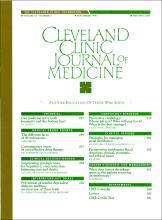Table of Contents
Editorial
- Can medicine serve both humanity and the bottom line?
Will the commitment to public health and community service be lost in the shift toward for-profit medicine?
Medical Grand Rounds
- The Different Faces of Thyrotoxicosis
Hyperthyroidism manifests itself in many ways, but clinical cues and the radioactive iodine uptake test can narrow the diagnosis.
- Contemporary issues in cost-effective drug therapy
There is more to controlling pharmacy costs than choosing the least expensive drug. Preventing medication errors and reducing overall costs is key.
Clinical Decision-Making
- Interpreting serologic tests for hepatitis C virus infection: balancing cost and clarity
ELISA screening tests for HCV have unacceptably high false-positive rates. Newer tests are more accurate, but costly.
Interpreting Key Trials
- Prevention of insulin-dependent diabetes mellitus: an overview of three trials
Clinicians are eagerly awaiting the results of three large-scale trials using different approaches to prevent IDDM.
Cardiology Dialogues
- Preventive cardiology: Whose job is it? Who will pay for it? What is the best strategy?
Should cardiologists, internists, or nurse practitioners lead prevention efforts? What is the role of diet in the era of the statins?
Clinical Reviews
- Strategies for managing atrial fibrillation
The limitations of current therapies for atrial fibrillation are forcing a rethinking of how they should be used.
- Preoperative autologous blood donation: clinical, economic, and ethical issues
Autologous blood transfusion is not without risk. The expense involved in reducing the use of allogeneic blood raises a number of ethical issues.
Cancer Diagnosis and Management
- What does tumor shrinkage mean to the patient receiving chemotherapy?
Chemotherapy is often considered successful. if the tumor shrinks. But does tumor shrinkage alleviate symptoms and prolong life?



